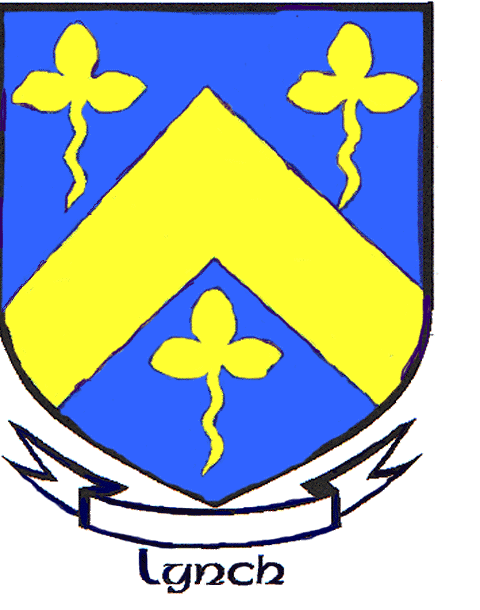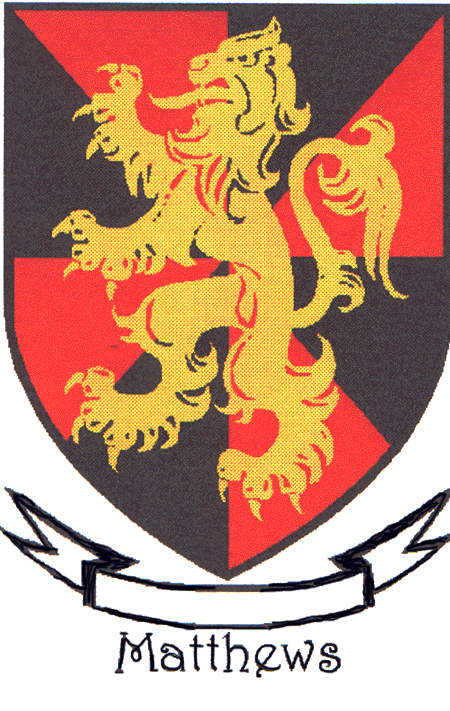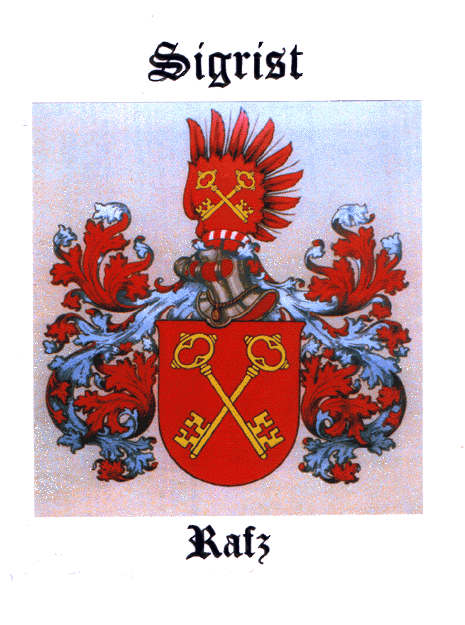
Histories of Names and Families

"Histories" are fascinating. There are so many questions. Did the Lynch family really originate from the Spaniards invading Ireland? Is that a "myth"? And why did my great grandmother change her name from Anna to Amelia when she came to America? Maybe the people at her port of entrance did that because they could not understand her. Why did my grandfather travel the "pond" from Wales? Why can't I find his departure ship? Was he a "stowaway" as one family member insists? Where are the other children of my great great grandmother who married a Hoerner? Was this in Iowa? What ever happened to my other great great grandmother who married a VonTobel in Germany?
Those questions
may be or may not be answered in time. What I have included on this page
are what I know of name origins and some family history. I'd like to thank Helen
and Stephen in England, Jon in Germany/Switzerland, Denise in America, Sue in
Canada, and Mike
in Wales, my Aunt Virginia, my grandfather Abraham, and my mom and dad.
Others will be "linked" at the end.
Name Origins:
Welsh Patronymics:
This is a very interesting naming pattern used by the Welsh. Every child took
the Father's forename as their surname. Sometimes they used
"ap", meaning "son of", or "verch", meaning
"daughter of". If Richard had a son named Thomas, Thomas eventually
became known as Thomas Richard. Thomas' son William would become Williams
Thomas. Then, if William had a son named Evan, he would be known as Evan
William. It makes for very difficult tracing of one's genealogy!!
Sometimes the vicars and parish clerks refused to accept a name if the family
had "abandoned" the patronymic system. In that case, you might be
thinking you are looking for an Abraham Mathews when in fact he is reported as
Abraham David because his father was a David. Such troubles!! He could have been
reported as Davies too. (Davies means "David's")
One other intriguing fact is that within families you might find (as I did) an
"s" on the end of the surname. Or you might find two "t"s.
Within my clan I have found some spelled the surname Mathew, Matthew,
Mathews,
and Matthews. That was in ONE family line!
Regardless, here is what I have learned about some of the surnames and the
forenames in my family, discrepancies and all.
Davies: The
Patronymic form of David. One estimate suggests that 11% of the Welsh
population was named David in the 17th century. In some areas of Cardiganshire,
22% of the population have the surname.
HARRIS: This
is a Patronymic name for "son of Harry". It can also be
spelled Harries.
JAMES: The
form "James" is used in the New Testament as the name of two of
Christ's apostles (James the brother of John and James the brother of
Andrew). It is considered English and is from a given name that has the
same origin as Jacob but is now felt to be a separate name in its own
right. It actually comes from Latin "Jacobus" and is a very
popular patronymic surname. It is popular because it was a saint's name
and by the 15th century, James accounted for 1% of all names. It can be found in
England as early as 1086 and is listed in the Domes Day Book. In Dutch, it
is Gjems.
LILLIG:
Though
mine came from Germany, one source states the surname if of Dutch origin and is
Lelij. I have seen also these spellings: Lilje, and Lilge, In
Nuremburg in 1381, the reference appears as "U/:/lein mit der Lyligen.
LYNCH: This
surname has two origins. One is Norman, from "de Lench" and is
most likely derived from a French placename that no one can remember. The
family settled initially in County Meath and a branch then was established in
Galway. It is considered one of the strongest of the famous "Tribes of
Galway". Between 1484 and 1654 there were 84 mayors of the city who
were Lynches. In Ireland, the term "lynching" is generally
believed to be from James Lynch a mayor in 1493 who hanged his own son for
murder. In the US, "lynching" is associated with Charles Lynch
who ordered punishments for any supporter of the British side in the
Revolutionary War. His arbitrary and cruel "justice" in Virginia
became known as the "Lynch Law".
The second origin is Gaelic, from the Irish "O'Loingsigh", grandson of
Loingseach meaning "seaman". It is found in Counties Clare,
Limerick, Sligo, West Cork, Cavan, Donegal, and the north Antrim/Derry
region. This Gaelic origin is responsible for the wide frequency of the
surname today. Another source states the surname is Celtic and means
"Sailor", "Pilot", and "Mariner".

Matthews:
The first Matthew was Dafydd (David)
ap Mathew born
about 1400 in Glamorganshire, Wales. By the mid 1500's, they moved to
various parts of the British Isles. Mathias is a variation of Mathew as is
Mathews, and Matthews. They are the English version of Mathew. Matthew is from
Middle English of biblical origin, ultimately from the Hebrew male given name Matityahu
"Gift of God". It is recorded in the Greek New
Testament in the form of Matth(a)ias. This was taken into Latin as both
Matthias and Matthaeus, the former being used for the apostle and the latter for
the evangelist. In most languages, the two forms have completely fallen
together. The forms Mathew and Ma(t)thias are found chiefly in
Wales. It is said that the first use of Matthews as a surname
occurred after Sir Mathew ap Evan (Jevan), eleventh Lord of Cardiganshire,
Wales, was knighted by Richard II in 1386. His sons took the surname
Mathews, adding the "s" to the father's given name instead of the
Welch spelling as had been done up to that time. It is not considered a very
common Welsh surname.

RICHARD: A
surname of Germanic origin, the name became very common after the Norman
conquest and was widely used in Wales by the 15th century.
SIGRIST:
This is the oldest surname of all of those in my family. The origin dates
from the pre-Reformation period. Documentary evidence suggests that it
dates from a time not earlier than 1100. Most sources state it cannot be
documented before the year 1261. The name has about 35 different spellings but
my family kept, and is still keeping, the Sigrist spelling. They
did, however, spell it Siegrist in America for the most part. It is
a phonetic spelling of the Medieval Latin "sacrista" which, in
English, is "sacrist". The "sacristin" was the one who
had charge of the church edifice, more specifically the robes and vestments of
the ritualistic service of the church.

SOME
GIVEN NAMES: Girls
first (Mostly
Welsh ideas)
![]()
ALICE: This is the English form of the French and German name Adelaide / Adalheidas. The name became very popular after 1875 when "Alice in Wonderland" was published.
Jennet:
This is a diminutive
form of Jane or Jean; the equivalent of Janet.
MARGARET:
Most Welsh families
had a Margaret especially in the 19th century. The name comes from the
Latin and Greek words for Pearl. (Of all names!!)
MARY: Almost
every 19th century family had a Mary. It comes from the Latin Maria
meaning "drop of sea".
MAUD:
This name is an
English medieval version of the name Matilda. The French name Matilda
was brought to England by William the Conqueror in 1066. It was the name of his
wife. This became a popular name after Tennyson published his poem called
"Maud" in 1855.
BOYS:
![]()
ABRAHAM: Along
with Isaac are, of course, very Biblical names. In Wales, they are not
too common anymore, but in the 19th century, use of these name probably meant
that the family was "Chapel going" and fairly strict.
DAVID: A
very Biblical name and the Patron Saint of Wales. The Welsh spelling is Dafydd
or the diminutive Welsh form Dai.
John:
This name is the
most universally common boy's name. The Welsh version is Evan.
I will be adding
more to this a bit later. On to some "fascinating" history of my
family.
©
Susan J. Brien,
Ed.D.
The
information on this web page is NOT to be copied by
genealogy companies
or persons for sale. It is Free,
however, for personal use, especially for my family.
